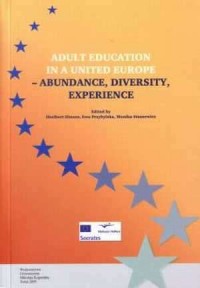Tytuł książki:
Adult education in a united Europe - abundance, diversity, experience
Autor książki:
Heribert Hinzen, Ewa Przybylska, Monika Staszewicz
(red.)
| Dane szczegółowe: | |
| Wydawca: | Uniwersytet Mikołaja Kopernika |
| Oprawa: | miękka |
| Ilość stron: | 376 s. |
| EAN: | 9788323118268 |
| ISBN: | 83-231-1826-4 |
| Data: | 2001-01-28 |
pozycja niedostępna
×
Opis książki:
This publication comprises three chapters. The first one documents the course of the Torun Conference, which was the main pillar of the Project. It contains some of the keynote speeches delivered duri
Książka "Adult education in a united Europe - abundance, diversity, experience" - Heribert Hinzen, Ewa Przybylska, Monika Staszewicz (red.) - oprawa miękka - Wydawnictwo Uniwersytet Mikołaja Kopernika.
Spis treści:
This publication comprises three chapters. The first one documents the course of the Torun Conference, which was the main pillar of the Project. It contains some of the keynote speeches delivered during the plenary sessions and presentations shared during workshops (also multimedia presentations). The second chapter provides examples of the best European practice in the area of intercultural learning. The conference participants were personally involved in the implementation of the majority of projects discussed in this chapter. To a large extent, it is their experience, openness to dialog, and commitment to intercultural learning, which turned the Torun meeting into such a content-rich event yielding tangible outputs. It enabled participants to develop new concepts of intercultural work, establish new partnerships, and rejuvenate the European dialog evolving around the current and future challenges faced by the European societies. The third chapter contains reports from intercultural learning surveys carried out under the Project and an outline of the intercultural learning model. The model was developed based on the experience and opinions of Conference participants, adult learners, and current users of vocational and general education in various educational institutions in Lithuania, Poland, and Germany. The Torun Conference brought together not only representatives of 32 countries, but also adult education experts active in various areas of education, educators who work with adult learners on a daily basis, academics who develop theories on adult education, politicians active on different levels of politics, activists from nongovernmental organizations, planners of educational offerings, and the academic community, especially students of education who in their future career will certainly revisit and act upon claims and petitions articulated at the Conference and during the subsequent stages of the Project. The participation of such a diverse group allowed us to approach problems of intercultural education from different perspectives and to learn about a number of views and opinions.

